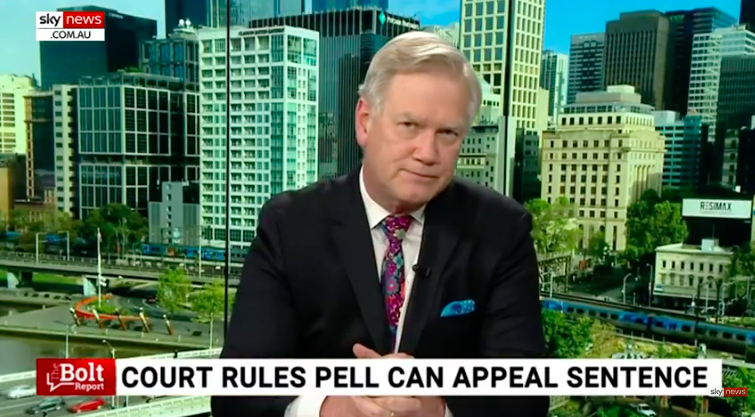Is Australian Public Opinion Shifting in Cardinal Pell’s Favor?
Some prominent figures in Australia are putting their heads above the parapet to express doubts about the cardinal’s conviction.

Although a good deal of negative and angry opinion abounds, a number of commentators are beginning to voice doubts about Cardinal Pell's conviction.
One of them is Andrew Bolt, an analyst for Sky News Australia, who has been consistent in voicing skepticism over the case but on Nov. 13 made his strongest declaration to date: That the cardinal is innocent and has been jailed “for a crime [he] could not have done" (see clip below).
He also said that activists “try to punish Sky and its advertisers" whenever he points out what he called “incredible problems with this extraordinary conviction.”

“And remember this,” Bolt concluded. “If you are ever falsely accused and falsely convicted, be glad there are some of us who might defend you, too, against the mob and may the High Court now fix this scandal.”
Other public figures have also stood by the cardinal, including two former Prime Ministers when the conviction was made public in February.
But more significant are those who defend Cardinal Pell who are not his friends, allies or sympathetic to him — and are nevertheless willing to incur the wrath of hostile public opinion in the process.
One such person is Peter Baldwin, a former minister in the Labor governments of Bob Hawke and Paul Keating, who wrote an op-ed Nov. 15 for The Australian under the headline “George Pell Sex Abuse Conviction Must Be Examined.”
“I have never been a huge fan of George Pell, sharing neither his religious convictions nor his conservative world view,” Baldwin began his article. “However, I was relieved by the decision of the High Court this week to hear his final appeal.”
Recalling his astonishment when Cardinal Pell's appeal was rejected in August, he said it prompted him to plow through the entire 325-page Court of Appeal’s judgement. A number of aspects surprised him “from the outset,” he said.
One was how could it be possible for an offence to be found “beyond reasonable doubt” based solely on uncorroborated testimony of a complainant, let alone in the face of substantial contrary evidence? “Isn’t that guilt by association?” Baldwin asked, echoing a question Cardinal Pell’s supporters have posed for months.
“How could a conviction be upheld when one of the two alleged victims denied being abused? Doesn’t that fact alone scream reasonable doubt?”
Referring to the split decision of the appellate court in Victoria, Baldwin recalled how dissenting judge Mark Weinberg found many testimonies in defence of Cardinal Pell to be “reasonably possible” and yet the phrase is not found anywhere in the judgment of the two judges, Anne Ferguson and Chris Maxwell, who upheld the conviction.
Instead he said those two justices took the view that the jury rightly convicted the cardinal based solely on the complainant’s testimony having a “ring of truth” about it, despite “multiple errors and inconsistencies.” Weinberg, by contrast, noted that the in some cases the complainant's testimony “made no sense,” he added.
Baldwin compared the case to the recent scandal in Britain of a police operation called “Operation Midland,” launched after a man named Carl Beech made uncorroborated accusations that former Prime Minister Edward Heath and a list of other prominent figures were part of a pedophile ring.
The accusations were all found to be false and Beech was sentenced to 18 years imprisonment in July for perverting the course of justice and fraud, but not before the reputations of elderly public figures, some dead and unable to defend themselves, had been destroyed. Like Cardinal Pell’s complainant, Baldwin noted, Beech’s claims had a “ring of truth” to them.
Baldwin concluded by highlighting the vast difference between Weinberg and Ferguson/Maxwell’s judgements, in particular Weinberg’s argument that the “realistic possibility that exculpatory testimony is accurate means a jury must acquit.”
If the complainant’s flawed testimony and the denial of one of the two alleged victims “do not falsify the accusation, just what would it take to warrant acquittal?” Baldwin asked.
He also pointed to the implausibility of Cardinal Pell committing such a brazen offense at a time when clerical sex abuse had “become a high-profile concern” and the cardinal had only several months earlier prepared his “Melbourne Response” to priestly abuse allegations.
“If the decision is upheld, every Australian should shudder,” Baldwin concluded. “There but for the grace of God…”














